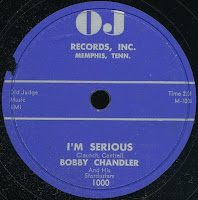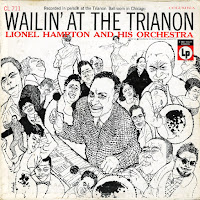Joe Bennett and the Sparkletones - Boppin' Rock Boogie (ABC-Paramount 45-9837), 1957
Due to the recent passing of Joe Bennett, I thought it would be a good idea to spotlight Joe Bennett & the Sparkletones' career a little bit more today. I chose not to include "Black Slacks" here but the flipside of the bands' top single, "Boppin' Rock Boogie." It is much in the same vein of all their other ABC-Paramount recordings but much lesser known.
The Sparkletones were made up of students from Cowpens High School in Spartansburg, South Carolina, formed in 1956. Joe Bennett was on vocals and lead guitar, Howard "Sparky" Childress on electric rhythm guitar, Wayne Arthur on bass, and Irving Denton on drums. The four teenagers played rock'n'roll locally. They were part of a musical transition that took place during this time: the rural rockabilly sound evolved into a smoother, urban style that was soon known as rock'n'roll.
In January 1957, the Sparkletones took part in a talent show at Spartansburg Memorial Auditorium, organized by CBS talent scout Bob Cox. The band won first prize and Cox was impressed right from the start. He was convinced the Sparkletones would became teenage stars and immidiately quit his job with CBS in order to manage the young group. Cox and his new protégés flew to New York City, where they signed a recording contract with ABC-Paramount.
Already the next day, the Sparkletones went into the studio to record the Bennett-Denton composition "Black Slacks" as well as "Boppin' Rock Boogie," written by Bennett and Arthur. Paul Anka, who had recorded hours before them in the same studio, watched them while they recorded and even sang harmony during their session. Both songs were released in the summer of 1957 on ABC-Paramount #45-9837, credited to "Joe Bennett and the Sparkletones." Cliff "Farmer" Grey was the first DJ to play "Black Slacks" at WSPA in Spartansburg. Soon other DJs also played the record and it eventually peaked #11 on Billboard's R&B charts and #17 on the Billboard Hot 100.
 |
| Billboard July 15, 1957, pop review |
The Sparkletones set out on the road to tour the US and to promote their record. The tour took them across the country to the west coast. They would also play the Stardust Hotel in Las Vegas for a couple of weeks. TV appearances on the Nat King Cole show, American Bandstand, and the Ed Sullivan show followed.
 |
| Promo picture of Joe Bennett and the Sparkletones |
In late 1957, ABC-Paramount released a follow-up, "Penny Loafers and Bobby Socks" b/w "Rocket" (ABC-Paramount #45-9867), which also hit the charts but only at #42. Nevertheless, the Sparkletones kept up a busy touring schedule across the country and recorded further singles, including the great "Cotton Pickin' Rocker." Subsequent singles failed to chart, however, and ABC-Paramount did not renew their contract in 1959. At the same time, Childress left the group and was replaced by Gene Brown. Denton also eventually left and was replaced by Donny Seay.
The Sparkletones signed a contract with Jack Gold's Paris Records. On the Paris label the group had one last minor hit. "Boys Do Cry," a slower teenage pop song coupled with "What the Heck" (Paris #45-537), reached #105 on the charts in 1959. In 1960, Box Cox left the group and the Sparkletones broke up in October 1960 after years of touring, promoting, and recording. Howard Childress performed country music for some time in the early 1960s.
Eventually, all members took regular day jobs and reunited from time to time in the 1990s. They appeared at the Viva Las Vegas Rockabilly Festival in 2011. Joe Bennett passed away on June 27, 2015, at the age of 75.

































